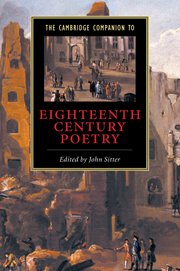Book contents
- Frontmatter
- 1 Introduction
- 2 Couplets and conversation
- 3 Political passions
- 4 Publishing and reading poetry
- 5 The city in eighteenth-century poetry
- 6 “Nature” poetry
- 7 Questions in poetics
- 8 Eighteenth-century women poets and readers
- 9 Creating a national poetry
- 10 The return to the ode
- 11 A poetry of absence
- 12 The poetry of sensibility
- 13 “Pre-Romanticism” and the ends of eighteenth-century poetry
- Index
6 - “Nature” poetry
Published online by Cambridge University Press: 28 May 2006
- Frontmatter
- 1 Introduction
- 2 Couplets and conversation
- 3 Political passions
- 4 Publishing and reading poetry
- 5 The city in eighteenth-century poetry
- 6 “Nature” poetry
- 7 Questions in poetics
- 8 Eighteenth-century women poets and readers
- 9 Creating a national poetry
- 10 The return to the ode
- 11 A poetry of absence
- 12 The poetry of sensibility
- 13 “Pre-Romanticism” and the ends of eighteenth-century poetry
- Index
Summary
“English nature,” that scenery of rolling hills, oak trees, green pastures, country houses, and churchyards overgrown with moss, is a creation of the eighteenth century. It is a landscape, but it is also a way of feeling - of feeling about native soil, of feeling about the past, of feeling about Englishness itself. Patriotism and nationalism, that is to say, are encoded in a symbolic view of a rural landscape and the way of life that is presumed to have flourished in that landscape. And this view has official sanction: “English Nature” is today the name of the government-sponsored organization responsible for conserving flora and fauna.
The eighteenth century was doubly responsible for the laying down of a landscape of nationalism in English people’s consciousness. It was a century of dramatic developments – of the landscaping of estates for the aristocracy who dominated power, of the enclosure of common fields, of agricultural “improvement.” But it was also a time in which writing about these developments became a means towards an idealization of social and political order, an idealization with which today’s lovers of English nature are frequently complicit. The National Trust, for example, dedicates itself to preserving the houses and parks once owned by great eighteenth-century landowners. It is currently restoring the park at Stowe to the flourishing condition that Alexander Pope celebrated in 1731, when he made it symbolize the moral and aesthetic judgment that, he said, fitted its owner, Lord Cobham, to direct the affairs of state:
Consult the Genius of the Place in all; That tells the Waters or to rise, or fall, Or helps th’ambitious Hill the heav’n to scale, Or scoops in circling theatres the Vale, Calls in the Country, catches opening glades, Joins willing woods, and varies shades from shades, Now breaks or now directs, th’intending Lines; Paints as you plant, and, as you work, designs.
(Epistle to Burlington, lines 57–64)- Type
- Chapter
- Information
- The Cambridge Companion to Eighteenth-Century Poetry , pp. 109 - 132Publisher: Cambridge University PressPrint publication year: 2001
- 4
- Cited by

